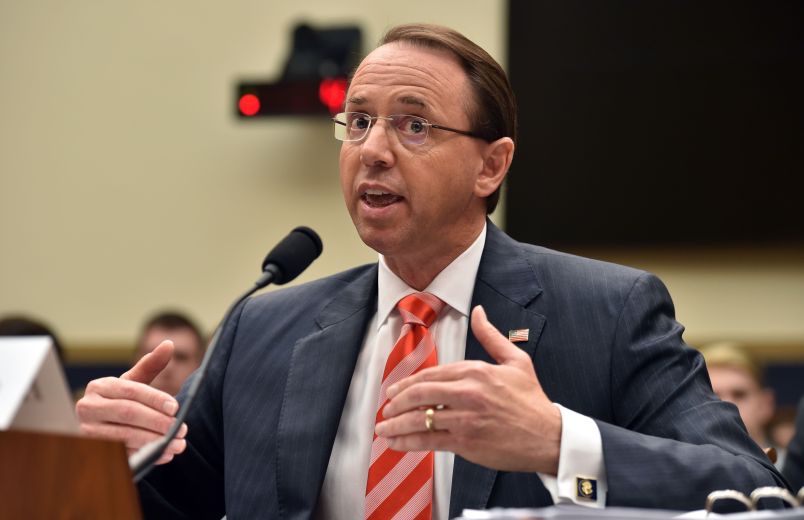Deputy Attorney General Rod Rosenstein, calmly but firmly, asked House Republicans to step back from their crusade to hold him in contempt of Congress and to consider other ways to settle their dispute over DOJ document production instead.
“We are not in contempt of this Congress, and we are not going to be in contempt of this Congress,” Rosenstein said at House Judiciary Committee hearing Tuesday. As Rosenstein and FBI Director Chris Wray were being subjected to bruising rounds of questioning, House Republicans voted in favor of resolution calling on the Justice Department to turn over requested documents by next week.
Democrats on the committee accused Republicans of using the hearing and the resolution to create a pretext for holding Rosenstein in contempt, which in turn could be used to impeach him or otherwise remove him from overseeing special counsel Robert Mueller’s investigation.
Wray and Mueller repeatedly tried to explain why the production of the documents was taking so long — pointing to the massive amount of documents requested and the sensitive information that legally the Justice Department is required to redact.
But Rosenstein only addressed the contempt threat directly after questioning by Rep. Darrel Issa (R-CA), where Issa attempted to force Rosenstein to commit that if he was held in contempt of Congress, he would refer it to a grand jury to consider for a criminal proceeding.
“So, the question is, would you allow the statute to go forward that says ‘shall’ present to a grand jury,” Issa said, quoting a relevant law, “or do you believe you have the ability to be above the law?”
“No, sir, I do not have the ability to be above the law,” Rosenstein said, before Issa cut him off and moved on to questioning Wray, even as Rosenstein appeared to want to further explain his answer.
Rosenstein indeed returned to the subject of contempt once Issa’s round was finished and pointed to a letter he recently sent to Congress because “not every member of Congress is a lawyer, let alone a prosecutor.”
“I think it’s important to understand, Mr. Chairman, that the fact that the department receives a subpoena and is unable to comply immediately because of volume or they need to make redactions, that doesn’t mean that we’re in contempt,” Rosenstein said.
He acknowledged that there “may be sometimes legitimate differences of opinion as to whether or not certain information is subject to being produced.”
“It doesn’t mean you’re in contempt. There are mechanisms to resolve this without threatening to hold people in contempt, which is, in fact, a crime,” Rosenstein said.
Rosenstein asked House Judiciary Chairman Bob Goodlatte (R-VA) to read his letter and consider how these disputes had been resolved “historically.”
“We’ll resolve it. If it needs to be resolved by a judge, you can seek enforcement of your subpoena civically in court,” the deputy attorney general said. “I’m working with a superb team, some of the best lawyers in the country, Democrats, Republicans, career, political appointees. We are not in contempt of this Congress and we are not going to be in contempt of this Congress.”







